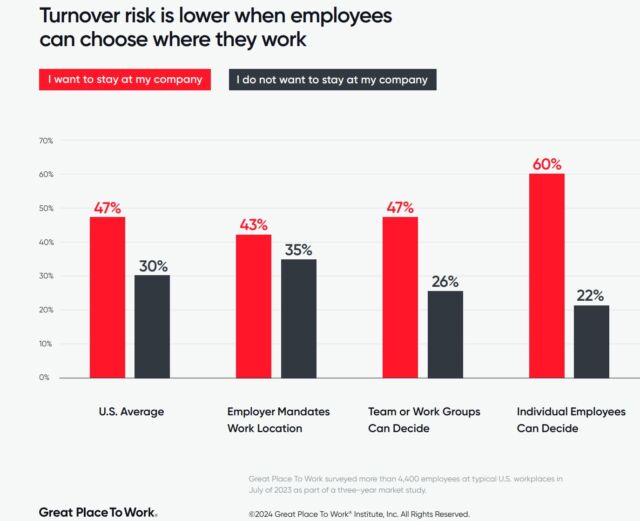RT-Oh No —
Survey of 4,400 US employees who are at least 18 years old.

US workers who work remotely are 27 percent more likely to look forward to doing their job, according to a survey of over 4,400 employees aged 18 and older.
The survey from Great Place to Work took place in July 2023, which was “the third year of an ongoing market study of US workplaces,” according to the report entitled “Return-to-Office Mandates and the Future of Work” (PDF). Of the participants, 51 percent were female, 49 percent were male, and less than 1 percent were “non-binary or other gender,” according to Great Place to Work. In terms of roles, half were “individual contributors,” 25 percent were “frontline managers,” 20 percent were mid-level managers, and 5 percent were executives. Eighty-eight percent were full-time workers versus part-time.
The survey also found that remote workers were 23 percent more likely to say they have “a psychologically and emotionally healthy workplace,” 19 percent were more likely to cite “high levels of cooperation,” and 18 percent were more likely to say that people avoid office politics and backstabbing.
Notably, however, survey respondents were unevenly on-site (65 percent) versus people who work remote all the time (16 percent) or sometimes (20 percent). When Ars Technica asked about this, a Great Place to Work spokesperson said that the report uses a confidence interval of 95 percent. They added: “Because of the overall size of our sample with 4,400 responses, we are still able to have statistically significant findings that illustrate the different needs of these two groups.”
The report says:
One explanation for the gap between remote and on-site workers: Employees of color reported finding a reprieve from unconscious bias and code switching when working remotely.
That doesn’t mean that companies must embrace fully remote work to be inclusive. Instead, great workplaces are finding ways to meet the needs of their employees and provide support to all workers regardless of where they work.
A theme of the report is highlighting the benefits of workplaces working with employees to understand their views on remote work and whether remote work options fit specific needs within the company. It’s also important to consider why people want to work remotely; if it’s due to factors like a toxic work environment, there are other ways to address worker concerns besides remote work, the authors said.
Earlier this year, another survey pointed to return-to-office (RTO) mandates hurting company morale. The survey of some companies on the S&P 500 list by University of Pittsburgh researchers found that RTO policies hurt employee satisfaction while failing to boost company value.
RTO mandates hurt employee retention
Great Place to Work’s report encourages companies to ensure that workers without remote work options “find special meaning in their work.” Companies should talk with in-person workers “about how their efforts are delivering on your brand mission” and hold valued in-person activities, the report said. Cisco, which the report notes doesn’t have an RTO mandate, tries to lure people to the office with things like hackathons, career coaching, and team gatherings, for example.
The report also says RTO mandates can hurt employee retention:
When employees have a say in where they work, retention improves.
Employees who report being able to decide where they work are more likely to stay with their company long-term.
More specifically, the report’s authors concluded that employees who are allowed to choose between in-person, remote, or hybrid work are three times more likely to want to stay at their company. They also found that workers who aren’t facing RTO mandates are 14 times less likely to “quit and stay.”

Great Place to Work
This isn’t the first survey we’ve seen suggesting that RTO mandates have driven workers away. In May, a study published by University of Chicago and University of Michigan researchers examining a reported 260 million résumés from People Data Labs reported that mandates requiring workers to return to the office either full or part-time led to a higher rate of employees, particularly of a senior level, leaving Apple, Microsoft, and SpaceX. (In 2022, numerous prominent Apple staff publicly resigned over RTO mandates.) A March survey of 1,504 full-time employees, including 504 HR workers, found that some firms have issued RTO mandates in the hopes of making people quit.